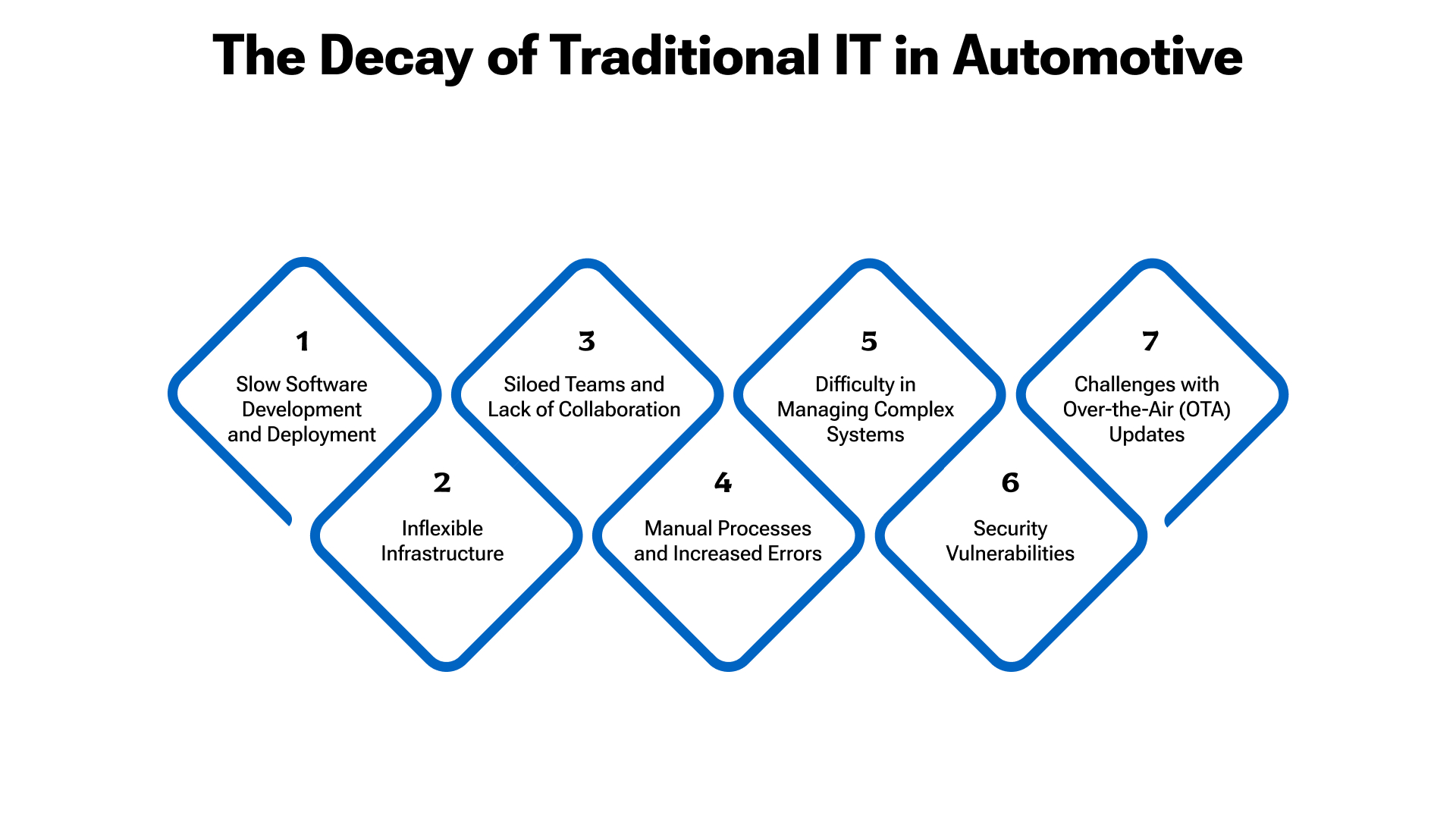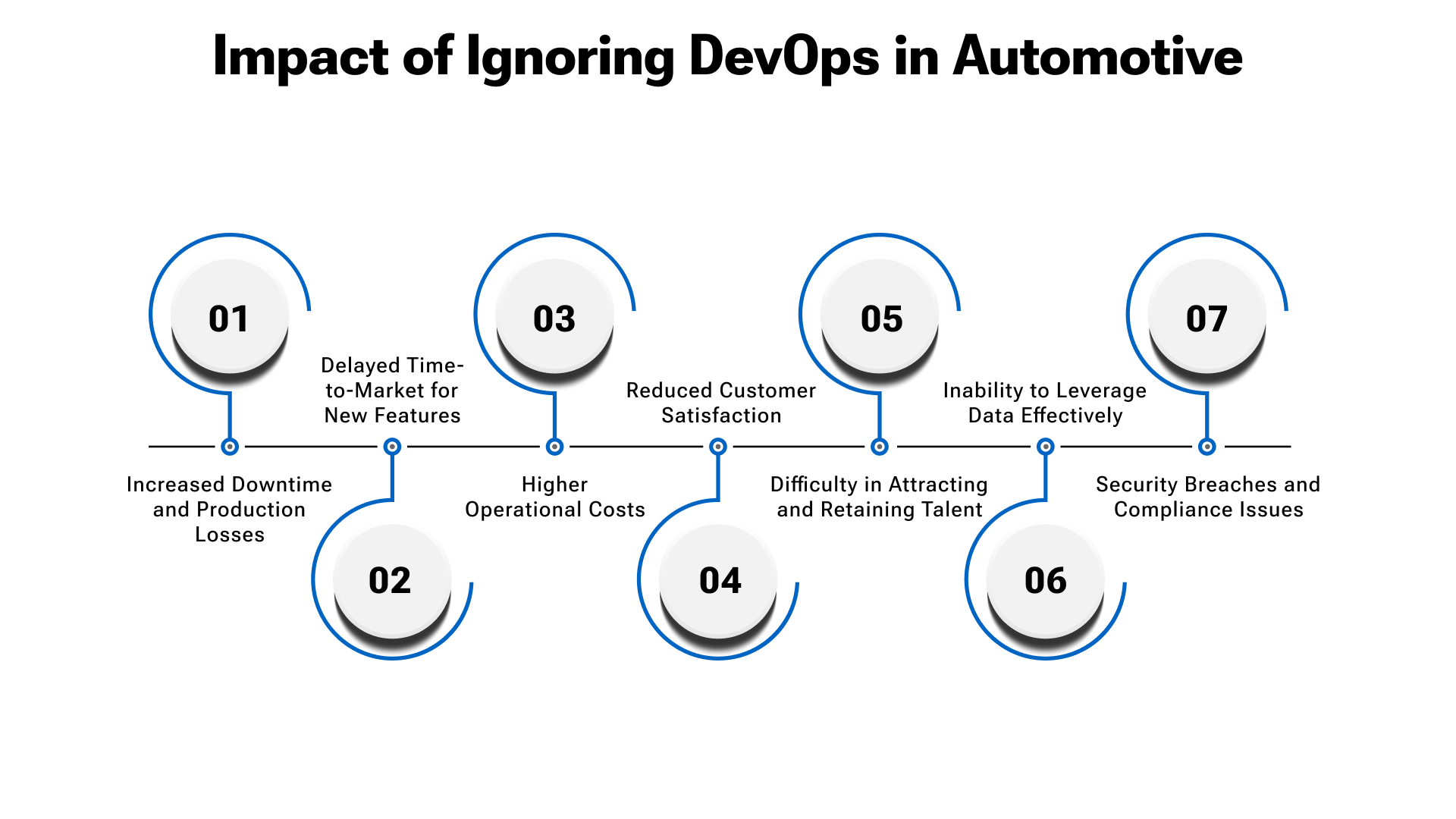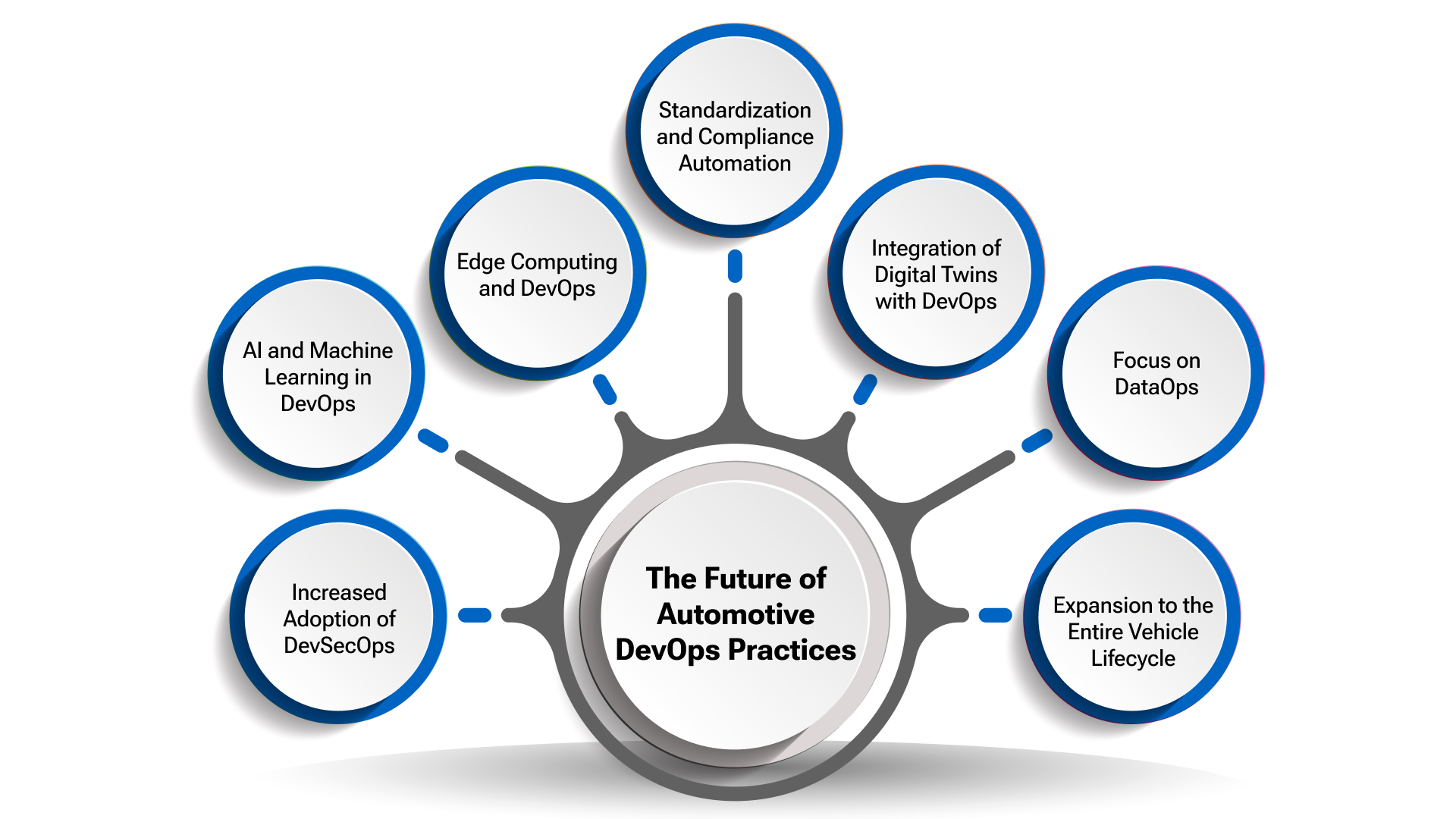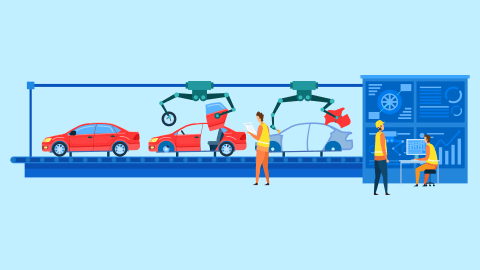The automotive industry, a sector long synonymous with mechanical engineering and intricate assembly lines, is now deeply intertwined with the digital realm. The proliferation of electric vehicles (EVs), the march towards autonomous driving, the increasing connectivity of cars, and the expectation of seamless Over-The-Air (OTA) updates fundamentally reshapes the automotive landscape. Vehicles are evolving from mere transportation devices into sophisticated, software-centric platforms.
This profound transformation places unprecedented demands on automotive IT infrastructure, forcing manufacturers to confront software scalability challenges in auto industry that were once overshadowed by the complexities of physical production. Alarmingly, a significant portion of auto manufacturers continue to operate with traditional, siloed IT models, often unaware of the substantial and escalating cost of not having DevOps in automative industry.
Consider the stark realities:
Delays deploying crucial software updates or new digital services can translate directly into lost market share and diminished customer satisfaction in this burgeoning market. These compelling statistics underscore the urgent need for agility and scalability within automotive IT, qualities that DevOps for auto manufacturers is uniquely positioned to deliver.
This comprehensive blog post delves deeper into why auto manufacturers grapple with IT scalability without DevOps. We will meticulously explore and expand upon the multifaceted cost of not having DevOps in automotive industry, illustrating the tangible repercussions across various aspects of the business.
The Crippling Constraints of Traditional IT in Automotive Manufacturing
Historically, the IT infrastructure within automotive manufacturing organizations was primarily architected to support foundational enterprise systems such as Enterprise Resource Planning (ERP) for resource management, Supply Chain Management (SCM) for logistics, and basic Manufacturing Execution Systems (MES) for shop floor control.
While these systems remain critical for core operations, they were often designed as monolithic entities, operating in relative isolation with long, sequential development lifecycles and infrequent updates. The emergence of software-intensive vehicles has starkly exposed the inherent limitations of this traditional approach, creating significant bottlenecks and inefficiencies across several crucial dimensions:

Slow Software Development and Deployment:
Traditional waterfall methodologies, characterized by rigid, sequential phases of planning, design, implementation, testing, and deployment, are still prevalent in many established automotive companies. This protracted development lifecycle starkly contrasts with the rapid iteration and continuous delivery demanded by modern software development services. The lengthy timelines associated with traditional approaches significantly hinder the swift deployment of new software features, critical bug fixes, and essential security updates for connected vehicles.
The cost of not having DevOps becomes acutely apparent in the form of delayed time-to-market for innovative features. This results in missed opportunities to capitalize on emerging market trends and potentially ceding ground to more agile competitors who can deliver software-driven value to customers faster.
For instance, the delay in rolling out a new advanced driver-assistance system (ADAS) feature due to slow deployment cycles can directly impact a vehicle's competitiveness and market appeal.
Inflexible Infrastructure:
Legacy IT infrastructure within automotive factories and supporting data centers is often characterized by its rigid and difficult-to-scale nature. Adding new server capacity, storage solutions, or network bandwidth to accommodate the exponential increase in data generated by connected vehicles, deploying new AI-powered manufacturing robots, or establishing new production lines can be arduous, time-consuming, and often disruptive.
This inherent lack of IT scalability in manufacturing severely impedes auto manufacturers' ability to adapt swiftly to fluctuating market demands, integrate new technologies seamlessly, and respond effectively to unforeseen surges in data processing requirements. Imagine the challenge of scaling the backend Automotive IT infrastructure issues to handle a sudden rise in usage of a new connected car service without a flexible and automated infrastructure.
Siloed Teams and Lack of Collaboration:
Traditional IT departments in automotive companies often function in distinct silos, with development teams focused on writing code, operations teams responsible for maintaining infrastructure, and quality assurance teams brought in at the tail end of the development process.
This lack of seamless collaboration and communication between these crucial teams leads to frequent misunderstandings, extended lead times for identifying and resolving issues, and increased friction throughout the entire software delivery pipeline.
The cost of not having DevOps for auto manufacturers manifests directly in operational inefficiencies, project delays, and a diminished ability to deliver high-quality software rapidly and reliably. For example, a bug identified late in the testing phase due to a lack of early collaboration can lead to significant delays and costly rework.
Manual Processes and Increased Errors:
A heavy reliance on manual processes for critical IT tasks such as software deployment, infrastructure provisioning, configuration management, and testing introduces a significant risk of human error. These errors can lead to system instability, security vulnerabilities, production disruptions, and increased operational costs.
This direct contribution to the cost of not having DevOps for auto manufacturers underscores the need for automation to ensure consistency, reliability and reduced risk. Consider the potential for misconfiguration during a manual server setup, which could lead to a security breach or system outage.
Difficulty in Managing Complex Systems:
Modern vehicles are increasingly complex, generating terabytes of data from sensors, infotainment systems, and advanced driver-assistance features. Simultaneously, manufacturing processes are becoming more intricate by integrating robotics, AI, and interconnected machinery. Traditional IT systems often struggle to effectively handle this massive influx of data and the intricate interdependencies of these modern automotive systems.
This hinders effective monitoring, real-time analysis, proactive issue detection, and overall system optimization. This complexity highlights the importance of adopting DevOps for manufacturing sector to provide the tools and methodologies necessary to manage this increasing complexity effectively. Imagine analyzing real-time performance data from thousands of connected vehicles using legacy, non-scalable data analytics tools.
Security Vulnerabilities:
The growing connectivity of vehicles and manufacturing systems dramatically expands the potential attack surface for cyber threats. Traditional security approaches, often implemented as an afterthought at the end of the development lifecycle, are proving less effective in proactively identifying and mitigating security vulnerabilities early in the software development process.
The cost of not having DevOps, particularly the security-focused DevSecOps approach, can be devastating regarding data breaches, intellectual property theft, production disruptions due to ransomware attacks, and severe reputational damage. The recall of vehicles due to software vulnerabilities is a stark reminder of these risks.
Challenges with Over-the-Air (OTA) Updates:
Over-the-Air (OTA) updates are rapidly becoming a fundamental requirement for modern vehicles, enabling manufacturers to deliver new features, fix software bugs, and improve vehicle performance remotely. Traditional IT infrastructure and software deployment processes are often ill-equipped to handle the sheer scale and complexity of simultaneously securely and reliably deploying software updates to millions of vehicles.
This critical limitation underscores the necessity of DevOps for manufacturing sector to establish the robust infrastructure and automated processes required for seamless and secure OTA capabilities. Consider the logistical nightmare of manually updating the software on millions of vehicles compared to the efficiency of a well-implemented OTA system.
The Tangible Economic Burden of Ignoring DevOps in Automotive
The ramifications of neglecting DevOps principles extend far beyond mere operational inefficiencies. The true cost of not having DevOps in automotive industry manifests as significant financial losses, hinders operational agility, and creates substantial competitive disadvantages in an increasingly digital marketplace:

Increased Downtime and Production Losses:
The Cost of Disruption: As previously highlighted, unplanned downtime in automotive manufacturing is prohibitive. Inefficient deployment processes, system instability stemming from manual configurations, and protracted issue resolution times – all direct consequences of a lack of DevOps practices – contribute significantly to these costly disruptions.
Whether in the assembly line control systems or the backend infrastructure supporting production planning, downtime issues in automotive systems can halt production entirely, leading to substantial financial losses due to missed production targets, idle workforce, and penalties for delayed deliveries. Industry estimates suggest that even a few minutes of downtime can translate into hundreds of thousands of dollars in losses for a large automotive manufacturer.
Delayed Time-to-Market for New Features:
The Innovation Lag: In the fiercely competitive and rapidly evolving automotive landscape, the ability to develop and deploy innovative software features swiftly is a crucial differentiator. With their lengthy development cycles and cumbersome deployment processes, traditional IT approaches severely impede this agility.
This results in significant delays in bringing new features, digital services, and enhanced functionalities to the market, potentially allowing more agile competitors to capture market share and customer loyalty.
The cost of not having DevOps for manufacturing sector is directly measured in lost revenue opportunities and a diminished competitive edge. For example, a delay in launching a new connected infotainment feature can make a vehicle less appealing than competitors offering similar or more advanced capabilities.
Higher Operational Costs:
The Efficiency Drain: The reliance on manual processes, inefficient resource utilization due to a lack of automation, and the need for extensive rework resulting from errors and system instability contribute significantly to inflated operational costs within automotive IT departments.
DevOps practices, such as infrastructure automation, continuous integration, and continuous delivery, can dramatically reduce these costs by streamlining workflows, optimizing resource allocation, and minimizing the need for manual intervention and error correction.
Reduced Customer Satisfaction:
The Loyalty Erosion: Delays in delivering crucial software updates, unresolved software bugs affecting vehicle functionality, and overall system instability can lead to significant customer frustration and damage brand reputation. In the era of connected vehicles, software plays an increasingly vital role in the overall customer experience, influencing everything from infotainment to safety systems.
The cost of not having DevOps for auto manufacturers can manifest as decreased customer loyalty, negative online reviews, and, ultimately, a decline in sales. Imagine the dissatisfaction of a customer experiencing persistent software glitches in their new vehicle that are not addressed promptly due to slow update cycles.
Difficulty in Attracting and Retaining Talent:
The Skills Gap: Highly skilled software engineers and IT professionals are increasingly drawn to organizations that embrace modern technologies, agile methodologies, and a culture of innovation – all hallmarks of a DevOps environment.
Automotive companies clinging to outdated IT practices and processes may struggle to attract and retain the top-tier talent necessary to drive digital transformation and innovation. This talent drain can further exacerbate existing IT challenges and hinder the adoption of modern practices like DevOps for manufacturing sector.
Inability to Leverage Data Effectively:
The Lost Insights: Modern vehicles and manufacturing processes generate an unprecedented volume of data, holding immense potential for valuable insights into vehicle performance, customer behavior, and operational efficiency.
However, without the scalable infrastructure and efficient data pipelines that DevOps enables, automotive manufacturers struggle to collect, process, store, and analyze this vast data deluge effectively. This inability to leverage data effectively translates into missed opportunities for optimization, innovation, and a deeper understanding of their customers and operations.
Security Breaches and Compliance Issues:
The Risk Amplification: Weak security practices resulting from a lack of integrated security throughout the software development lifecycle (a core tenet of DevSecOps) significantly increase the risk of costly security breaches and compliance violations.
The cost of not having DevOps in this critical area can be catastrophic, leading to financial penalties, legal repercussions, reputational damage, and erosion of customer trust. Modern vehicles' interconnected nature makes them potential targets for cyberattacks, highlighting the urgency of embedding security into every stage of the development process.
The Transformative Advantages of DevOps for Automotive Manufacturers
Implementing comprehensive DevOps solutions for manufacturers offers a potent and multifaceted remedy to the abovementioned challenges. By cultivating a culture of collaboration, automating critical processes, and embracing a philosophy of continuous improvement, DevOps empowers automotive companies to achieve unprecedented levels of agility, operational efficiency, and IT scalability: 
Accelerated Software Delivery:
The Velocity Advantage: Strategic DevOps implementation in manufacturing revolutionizes the traditional software development and deployment pipeline by introducing robust automation, continuous integration (CI), and continuous delivery (CD) pipeline practices.
This streamlined approach enables significantly faster release cycles for new software features, critical bug fixes, and essential security updates. The resulting reduction in time-to-market enhances responsiveness to evolving market demands and allows manufacturers to deliver value to customers more rapidly and frequently.
Improved IT Scalability and Reliability:
Adopting Infrastructure-as-Code (IaC) principles and sophisticated automation tools within a DevOps framework allows for rapid, on-demand provisioning and scaling of IT resources.
This ensures that the underlying infrastructure can seamlessly handle the escalating demands of data-intensive connected vehicles, the deployment of advanced manufacturing technologies, and fluctuations in operational needs. Consequently, IT scalability in manufacturing is dramatically enhanced, improving overall system reliability, resilience to outages, and optimizing resource utilization.
Enhanced Collaboration and Communication:
DevOps solution for manufacturers fundamentally breaks down the traditional silos that exist between development, operations, quality assurance, and even security teams, fostering a culture of seamless collaboration and shared responsibility throughout the entire software lifecycle.
This improved communication and closer alignment lead to faster problem resolution, reduced development process friction, and increased team efficiency and productivity.
Increased Automation and Reduced Errors:
Automating repetitive and manual IT tasks, such as software testing, deployment procedures, infrastructure provisioning, and configuration management, significantly reduces the inherent risk of human error, ensures greater consistency across environments, and frees up valuable IT personnel to focus on more strategic and innovative initiatives.
The benefits of DevOps in production environments with DevOps principles enable vehicle production software automation, which can extend beyond IT infrastructure to optimize software deployment to manufacturing equipment.
Enhanced Security (DevSecOps):
The Security-First Approach: Integrating security practices proactively throughout the entire software development lifecycle, a core principle of DevSecOps, ensures that potential security vulnerabilities are identified and addressed early in the process rather than being bolted on as an afterthought.
This proactive approach of IT modernization in car companies significantly reduces the risk of costly security breaches, strengthens the overall security posture of connected vehicles and manufacturing systems, and ensures compliance with relevant industry regulations.
Seamless Over-the-Air (OTA) Updates:
The Continuous Improvement Channel: Robust DevOps practices and sophisticated automation tools are essential for enabling the efficient, reliable, and secure delivery of Over-the-Air (OTA) software updates to millions of vehicles in the field.
This capability ensures that customers always have access to the latest features, critical bug fixes, and performance improvements, enhancing customer satisfaction and enabling continuous vehicle evolution.
Improved Data Management and Analytics:
The Insight Engine: DevOps facilitates creating robust, scalable, and automated data pipelines crucial for collecting, processing, storing, and analyzing the vast amounts of data generated by modern vehicles and manufacturing operations.
This enhanced data management and analytics capability empowers automotive manufacturers to gain valuable insights into vehicle performance, customer behavior, and operational efficiency, leading to data-driven decision-making and continuous improvement.
Faster Innovation and Competitive Advantage:
DevOps empowers automotive manufacturers to innovate faster and gain a significant competitive advantage in the rapidly transforming automotive landscape by fostering a culture of agility, accelerating software delivery cycles, and improving overall IT efficiency.
The ability to quickly adapt to changing market demands and deliver innovative software-driven features is a key differentiator in the modern automotive industry. DevOps principles and practices fundamentally underpin Agile transformation in the automotive industry.
Best Practices for DevOps Adoption in Automotive
Successfully implementing DevOps in automotive industry within the complex environment requires a strategic and phased approach. Several DevOps best practices can guide this transformation:
- Foster a Culture of Collaboration and Shared Responsibility: Break down silos between development, operations, security, and even business teams. Encourage open communication, shared goals, and a sense of collective ownership for the entire software delivery lifecycle.
- Embrace Automation at Every Stage: Identify and automate repetitive tasks across the software development and deployment pipeline, including code building, testing, infrastructure provisioning, configuration management, and deployment.
- Implement Continuous Integration and Continuous Delivery (CI/CD): Establish automated processes for frequently integrating code changes and reliably and consistently releasing software updates.
- Adopt Infrastructure-as-Code (IaC): Manage and provision infrastructure using code rather than manual processes, enabling scalability, consistency, and version control.
- Prioritize Security Throughout the Lifecycle (DevSecOps): Integrate security considerations into every stage of the software development process, from design to deployment and monitoring.
- Implement Comprehensive Monitoring and Logging: Establish robust monitoring and logging systems to gain real-time visibility into application performance, infrastructure health, and security events.
- Embrace Feedback and Continuous Improvement: Establish feedback loops across teams and continuously iterate on processes and tools to optimize efficiency and effectiveness.
- Start Small and Iterate: Begin with pilot projects and gradually expand DevOps adoption across different teams and departments.
- Invest in Training and Upskilling: Provide adequate training and resources to equip teams with the necessary DevOps skills and knowledge.
Common Challenges in Automotive DevOps Adoption
While the benefits of DevOps for automotive are significant, the adoption process is not without its challenges:
- Legacy Systems and Infrastructure: Integrating modern DevOps practices with complex and often outdated legacy IT systems can be a significant hurdle.
- Organizational Culture and Resistance to Change: Overcoming deeply ingrained traditional IT practices and fostering a new culture of collaboration and automation can face resistance within the organization.
- Security and Compliance Requirements: The highly regulated nature of the automotive industry and the critical safety implications of vehicle software require careful consideration of security and compliance throughout the DevOps pipeline.
- The complexity of Automotive Systems: Modern vehicles' intricate nature and interconnected systems can make implementing and managing DevOps practices challenging.
- Skills Gap: Finding and retaining IT professionals with specific DevOps skills and experience relevant to the automotive industry can be challenging.
- Integrating with Manufacturing Processes: Extending DevOps principles beyond traditional IT to integrate with manufacturing execution systems and industrial automation requires careful planning and execution.
The Future of DevOps in the Automotive Industry
The future of DevOps in automotive industry is inextricably linked to the evolution of software-defined vehicles and intelligent manufacturing. We can expect to see the following trends shaping this landscape:

- Increased Adoption of DevSecOps: With the growing threat of cyberattacks on connected vehicles and manufacturing systems, integrating security into every stage of the DevOps pipeline will become even more critical.
- AI and Machine Learning in DevOps: AI-powered DevOps tools will increasingly automate tasks, predict potential issues, and optimize the software delivery process.
- Edge Computing and DevOps: As more processing moves to the edge (within the vehicle and on the factory floor), DevOps practices will need to adapt to manage and deploy software and updates to distributed edge devices efficiently and securely.
- Standardization and Compliance Automation: As the automotive industry matures in its DevOps adoption, we will likely see the development of industry-specific standards and increased automation of compliance checks within the DevOps pipeline.
- Integration of Digital Twins with DevOps: Digital twins of vehicles and manufacturing processes will be increasingly integrated with DevOps pipelines to facilitate testing, simulation, and continuous improvement.
- Focus on DataOps: With the massive amounts of data generated by connected vehicles and smart factories, DataOps practices will increasingly integrate with DevOps to ensure efficient and reliable data management and analytics.
- Expansion to the Entire Vehicle Lifecycle: DevOps principles will extend beyond software development to encompass the entire vehicle lifecycle, from design and manufacturing to in-service updates and end-of-life management.
VLink: Empowering Automotive IT Scalability Through DevOps
In the evolving automotive sector, marked by intricate software and connectivity demands, VLink partners with manufacturers to achieve crucial IT scalability via strategic DevOps adoption. Recognizing the limitations of traditional IT, VLink offers tailored DevOps consulting services to dismantle silos, automate processes, and cultivate continuous improvement.
Our focus enables accelerated innovation through faster software deployment, agile infrastructure via automation, enhanced operational efficiency by streamlining workflows, robust security via DevSecOps integration, and seamless OTA update capabilities.
VLink’s dedicated team serves as a trusted guide, assisting automotive companies throughout their DevOps journey, from strategic planning to DevOps implementation in manufacturing and ongoing support. Our deep understanding of the industry's unique needs and proven DevOps methodologies empower clients to master IT scalability, drive innovation, and excel in the software-centric automotive future.
Partnering with VLink transforms IT from a constraint into a robust growth and competitive edge driver.
Wrap Up!
The automotive industry is undergoing a profound transformation, and DevOps is no longer a mere buzzword but a fundamental necessity for survival and success. By embracing DevOps best practices, automotive manufacturers can overcome the limitations of traditional IT, unlock unprecedented levels of agility and scalability, and pave the way for a future of innovation and customer-centricity. The cost of not having DevOps will only escalate as vehicles become increasingly software-driven and the competitive landscape intensifies.
Contact us today to explore how our specialized DevOps consulting services can empower your automotive organization to navigate the complexities of digital transformation, overcome software scalability challenges in auto industry, accelerate innovation cycles, and achieve sustainable growth in this dynamic and evolving industry.










 Shivisha Patel
Shivisha Patel

















